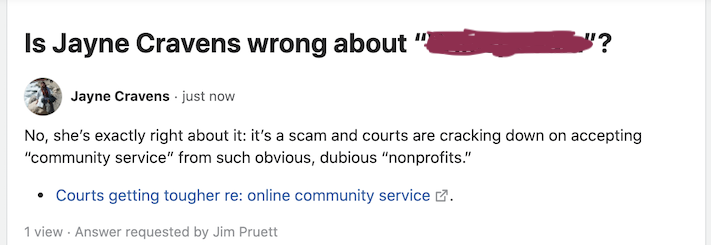
It is not unusual, nor automatically unethical, for a program to charge people who want to participate as a volunteer in a program. Even the Girl Scouts of the USA asks volunteers to pay a very small fee to become an official member (but will waive that fee for anyone who says they cannot afford it), and some Habitat for Humanity chapters and food banks asks groups coming from one organization, particularly from the corporate world, to pay a fee to help cover the costs of staff that set up the site for their feel-good-for-a-few-hours volunteering gig.
Volunteers are not free: people have to screen applicants (and even if a program has an automated system that screens applicants, someone has to be paid to build that system), train those volunteers (again, even if this is an automated system, someone usually has to be paid to build it), support the volunteers, track their progress, etc. Volunteers might be asked to pay for their own criminal background checks or a uniform as well. Most programs that have a cost they ask volunteers to pay will waive that cost for any qualified applicant who says they cannot afford it.
There are also online programs that ask volunteers to pay a fee in order to participate in their virtual volunteering activities. There are the programs I consider ethical, like Business Council for Peace (BPEACE), a USA-based nonprofit that recruits business professionals to help entrepreneurs in countries emerging from conflict to create and expand businesses and employment (particularly for women), like El Salvador and Guatemala. Bpeace asks its Skillanthropists to make a monthly donation during their participation, which both helps cover just a bit of BPEACE’s costs and which makes the volunteers financial investors as well, which can help with retainment. There are also university programs that have pivoted their student volunteering programs abroad to online versions because of the COVID-19 pandemic, and the tuition that students pay to participate helps cover the substantial administrative costs of converting these programs online (including hiring me sometimes – I’ve done workshops for two universities to prepare their administrative staff, partner NGOs and students for virtual volunteering – that work earlier this year lead me to create this robust list of high-impact virtual volunteering projects).
But there are the online programs I consider highly unethical for asking volunteers to “donate.” For instance, there’s a nonprofit that has no list of board of directors or staff – just lots of information about its founder (and, apparently, sole employee), who wants to charge people $250 “to initiate” a request to volunteer with the initiatives it says it has created, like a “teen hackathon” that has no dates of actual hackathons and stock photos (not photos of its supposed events – probably because there haven’t been any). This “organization” also has an emphasis on recruiting volunteers who can develop iOS Mobile Apps so the nonprofit to accept donations, and to “conduct a fundraiser for your app development” for its program. And it wants volunteers to, on its behalf conduct “outreach to employees of matching gift companies” to donate to the “nonprofit” – thereby doubling the gift.
There are also programs, many of which that used to regularly post to the volunteer sections of Craigslist, claiming that if you will “fundraise” (pay) a certain amount for a nonprofit with a dubious, vague mission statement, the nonprofit will provide a letter saying you did a certain amount of community service (volunteering) hours for them – how many hours they will say depends on how much “fundraising” you did (how much you pay them). There’s also “nonprofits” that say you can pay to “take courses online” and then get a certificate asserting how many hours you spent in those “community service” classes.
I first blogged about such scams in 2011, and kept blogging throughout the years about such:
- Courts being fooled by online community service scams.
- online volunteer scam goes global.
- Update on a virtual volunteering scam.
- Online community service company tries to seem legit.
- Haters gonna hate (when at least one of these scammers started targeting me)
- Community Service Help Cons Another Person
- Proud to fool courts re: community service
- Courts getting tougher re: online community service.
- Consequences for faking community service,
One person got so frustrated with me outing their “nonprofit” for being a scam that they created a Quora question specifically about me.

My advice: NEVER make a donation in order to volunteer online unless the program:
- is a 501 c 3 listed on Guidestar (if in the USA) or is a long-established, credible PUBLIC university.
- lists its board of directors, staff members (and their credentials), and yearly financials/annual reports.
- lists events and program it has undertaken, with dates, number of participants, measures of success, etc. – if it says they do teen hackathons, what were the dates of those hackathons, how many teens participated in each, where were they and where is the list of apps that were developed?
- will put you in touch with an actual, long-term online volunteer with the program who will answer your questions via phone or video conference.
- will say, in writing, that the photos on its web site are NOT stock photos but are, in fact, photos of volunteers, clients or other participants (or, if not, has an excellent reason for using a stock photo).
If any news reporter wants to do a story specifically about these virtual volunteering scams and wants the names of actual programs I consider unethical and, possibly, illegal, email me at jayne @ coyotebroad.com (note spaces) and I will be happy to pass over the list I maintain. And I’m happy to be interviewed about these programs and how people can know the difference between legitimate virtual volunteering programs online, like these, and those that are there primarily to take your money.
For very detailed information about the qualities of a credible virtual volunteering program, including online mentoring programs, there is The Last Virtual Volunteering Guidebook, available for purchase as a traditional print book or as a digital book. You will not find a more detailed, realistic guide anywhere for working with online volunteers, for using the Internet to support and involve all volunteers, and for evaluating the effectiveness and results of virtual volunteering activities. It’s a book written for those managing programs that want to involve online volunteers or to better support traditional volunteers with online tools, for those that want to improve their existing virtual volunteering programs, and for those undertaking research regarding virtual volunteering for any reason. If you are a consultant that wants to train others regarding virtual volunteering, this is your guide on how to become an expert (along with volunteering online and engaging volunteers yourself, which is essential to be a credible trainer).
August 24, 2020 update: here are four articles from other organizations and consultants that talk about how to evaluate the credibility of a nonprofit or charity before you donate or volunteer:
- Chapter 16 of the free online book Be Credible: Information Literacy for Journalism, Public Relations, Advertising and Marketing Students reviews how to evaluate the credibility of nonprofits. TERRIFIC resource, helpful to more than journalists.
- 2010 article: What makes a nonprofit news org “legit”? Here’s one six-fold path. It’s not just good for evaluating nonprofit media outlets – a lot of these suggestions are excellent for evaluating the credibility of any nonprofit or charity.
- NonprofitsFirst has a set of Accreditation Standards “to support organizations in achieving the highest levels of nonprofit excellence” & the standards are great measures to use when evaluating any nonprofit’s credibility.
- The USA Federal Trade Commission has a web page listing things to consider before donating to a charity or nonprofit. Good measures for evaluating programs before you volunteer as well.
Also see, from, my web site, these resources on evaluating a nonprofit’s credibility:
- The Information About & For Volunteers You Should Have on Your Web Site: If your program involves volunteers, or wants to involve volunteers, there are certain things your organization or department must have on its web site. To not have this information says that your organization or department takes volunteers for granted, does not value volunteers beyond money saved in salaries, or is not really ready to involve volunteers.
- Use Tech to Show Your Accountability and To Teach Others About the Nonprofit Sector! Mission-based groups are under growing scrutiny. What you put on your web site can help counter the onslaught of “news” stories regarding mission-based organizations and how they spent charitable contributions.
- Hosting International Volunteers: A Where-To-Start Guide For Local Organizations (and a guide for how to distinguish your NGO from potentially unscrupulous ones)
July 12, 2022 update: I just found a company promoting virtual volunteering to support communities in the developing world – and it requires online volunteers to pay to participate: the one-month fee is $800 and the six-month fee is $2300. These fees are absolutely outrageous and entirely uncalled for. I’m not linking to them, just as I don’t link to other unethical programs, because I don’t want to promote them, but if you want to know the name of such, especially if you are from the media, feel free to contact me.

If you have benefited from this blog or other parts of my web site and would like to support the time that went into researching information, developing material, preparing articles, updating pages, etc. (I receive no funding for this work), here is how you can help.

